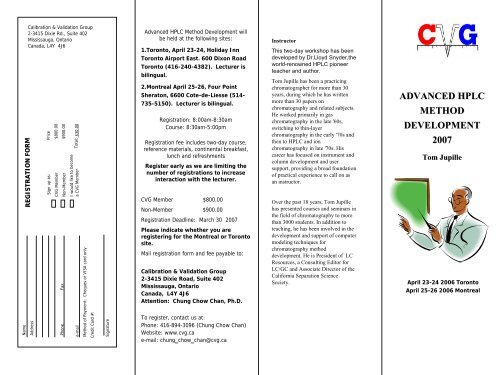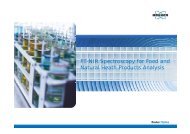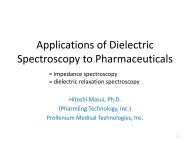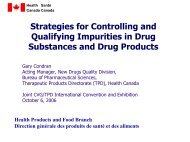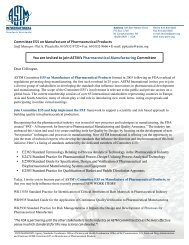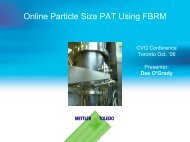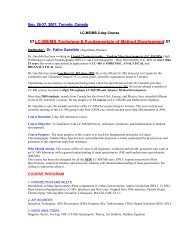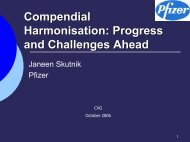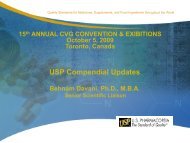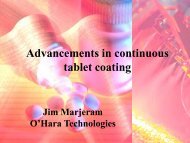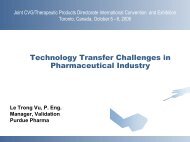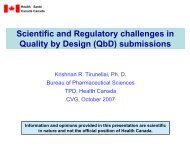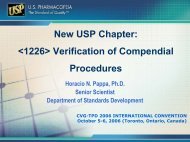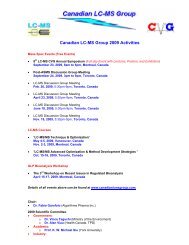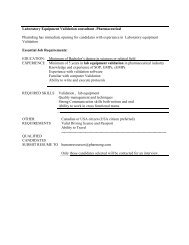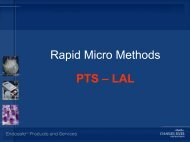Advanced HPLC Method Development Course Instructor - CVG
Advanced HPLC Method Development Course Instructor - CVG
Advanced HPLC Method Development Course Instructor - CVG
Create successful ePaper yourself
Turn your PDF publications into a flip-book with our unique Google optimized e-Paper software.
Calibration & Validation Group<br />
2-3415 Dixie Rd., Suite 402<br />
Mississauga, Ontario<br />
Canada, L4Y 4J6<br />
Sign up as: Price<br />
Total:______<br />
<strong>Advanced</strong> <strong>HPLC</strong> <strong>Method</strong> <strong>Development</strong> will<br />
be held at the following sites:<br />
1.Toronto, April 23-24, Holiday Inn<br />
Toronto Airport East. 600 Dixon Road<br />
Toronto (416-240-4382). Lecturer is<br />
bilingual.<br />
2.Montreal April 25-26, Four Point<br />
Sheraton, 6600 Cote-de-Liesse (514-<br />
735-5150). Lecturer is bilingual.<br />
Registration: 8:00am-8:30am<br />
<strong>Course</strong>: 8:30am-5:00pm<br />
Registration fee includes two-day course,<br />
reference materials, continental breakfast,<br />
lunch and refreshments<br />
Register early as we are limiting the<br />
number of registrations to increase<br />
interaction with the lecturer.<br />
<strong>Instructor</strong><br />
This two-day workshop has been<br />
developed by Dr.Lloyd Snyder,the<br />
world-renowned <strong>HPLC</strong> pioneer<br />
teacher and author.<br />
Tom Jupille has been a practicing<br />
chromatographer for more than 30<br />
years, during which he has written<br />
more than 30 papers on<br />
chromatography and related subjects.<br />
He worked primarily in gas<br />
chromatography in the late '60s,<br />
switching to thin-layer<br />
chromatography in the early '70s and<br />
then to <strong>HPLC</strong> and ion<br />
chromatography in late '70s. His<br />
career has focused on instrument and<br />
column development and user<br />
support, providing a broad foundation<br />
of practical experience to call on as<br />
an instructor.<br />
ADVANCED <strong>HPLC</strong><br />
METHOD<br />
DEVELOPMENT<br />
2007<br />
Tom Jupille<br />
REGISTRATION FORM<br />
Name<br />
Address<br />
<strong>CVG</strong> Member $800.00<br />
Non-Member $900.00<br />
Phone Fax<br />
I would like to become<br />
a <strong>CVG</strong> Member $30.00<br />
e-mail<br />
<strong>Method</strong> of Payment: Cheques or VISA card only<br />
Credit Card #:<br />
Signature<br />
<strong>CVG</strong> Member $800.00<br />
Non-Member $900.00<br />
Registration Deadline: March 30 2007<br />
Please indicate whether you are<br />
registering for the Montreal or Toronto<br />
site.<br />
Mail registration form and fee payable to:<br />
Calibration & Validation Group<br />
2-3415 Dixie Road, Suite 402<br />
Mississauga, Ontario<br />
Canada, L4Y 4J6<br />
Attention: Chung Chow Chan, Ph.D.<br />
To register, contact us at:<br />
Phone: 416-894-3096 (Chung Chow Chan)<br />
Website: www.cvg.ca<br />
e-mail: chung_chow_chan@cvg.ca<br />
Over the past 18 years, Tom Jupille<br />
has presented courses and seminars in<br />
the field of chromatography to more<br />
than 3000 students. In addition to<br />
teaching, he has been involved in the<br />
development and support of computer<br />
modeling techniques for<br />
chromatography method<br />
development. He is President of LC<br />
Resources, a Consulting Editor for<br />
LC/GC and Associate Director of the<br />
California Separation Science<br />
Society.<br />
April 23-24 2006 Toronto<br />
April 25-26 2006 Montreal
ADVANCED <strong>HPLC</strong><br />
METHOD<br />
DEVELOPMENT<br />
ADVANCED <strong>HPLC</strong><br />
METHOD DEVELOPMENT<br />
Goals and Objectives<br />
The purpose of this course is to teach<br />
you how recent developments in<br />
<strong>HPLC</strong>, combined with proven<br />
logic,provide the basis for a powerful<br />
new approach to systematic method<br />
development.The power of computer<br />
modeling will allow each participant to<br />
test the principles covered in the course<br />
on on a series of real-world problems.<br />
Program<br />
Who Should Attend<br />
This is not a course for beginners.<br />
Each attendee should have at least one<br />
year of <strong>HPLC</strong> practical experience in<br />
<strong>HPLC</strong> laboratory and preferably have<br />
been involved in developing new<br />
methods or troubleshooting older ones.<br />
This course is for chromatographers<br />
who want to develop better methods<br />
faster and less expensively …and for<br />
those who want to know how to do the<br />
best possible chromatography.<br />
PROGRAM<br />
Learn the modern approach to<br />
method development<br />
•Define your objectives clearly. For<br />
example your objective may be:<br />
-to separate and account for all<br />
impurities at 0.1% level<br />
-to develop rugged and precise<br />
methods<br />
-to have methods validated and<br />
accepted by regulatory bodies<br />
e.g. TPD and FDA<br />
•Apply the best approach to<br />
separating mixtures that contain<br />
acids,bases,or isomers or complex<br />
samples<br />
•Take advantage of recent<br />
improvements in column technology<br />
to assist you in your method<br />
development<br />
Learn how to develop a<br />
satisfactory method<br />
•Learn how to develop rugged<br />
methods that have superior<br />
separation repeatability.<br />
•Design system suitability checks<br />
and validation<br />
•Understand the factors controlling<br />
method precision.<br />
Improve your troubleshooting<br />
skills<br />
COURSE OUTLINE<br />
Day 1<br />
Registration/continental breakfast<br />
Introduction<br />
Introduction to <strong>HPLC</strong> <strong>Method</strong><br />
<strong>Development</strong><br />
Review of Separation Basics<br />
Workshop:Varying %B and Column<br />
Conditions<br />
Lunch<br />
New Column <strong>Development</strong>s<br />
Reversed-Phase <strong>HPLC</strong> for Neutral<br />
Samples<br />
Workshop:Effects of Solvent Type on<br />
Separation<br />
Workshop:Mixing Solvents<br />
Reversed-phase <strong>HPLC</strong> of Ionic<br />
Samples<br />
Workshop:Optimizing pH and %B for<br />
a Mixture of Acids and Bases<br />
COURSE OUTLINE<br />
Day 2<br />
Continental breakfast<br />
Ion-Pair <strong>HPLC</strong><br />
Workshop:Ion-Pair Chromatography<br />
Gradient Elution<br />
Workshop:Gradient Elution<br />
Lunch<br />
Experimental Aspects of Gradient<br />
Elution<br />
Dealing with Special Samples<br />
Improving Precision, and System<br />
Suitability<br />
Discussion of student problems<br />
•Develop improved problem-solving<br />
techniques based on this logical<br />
approach to method development


